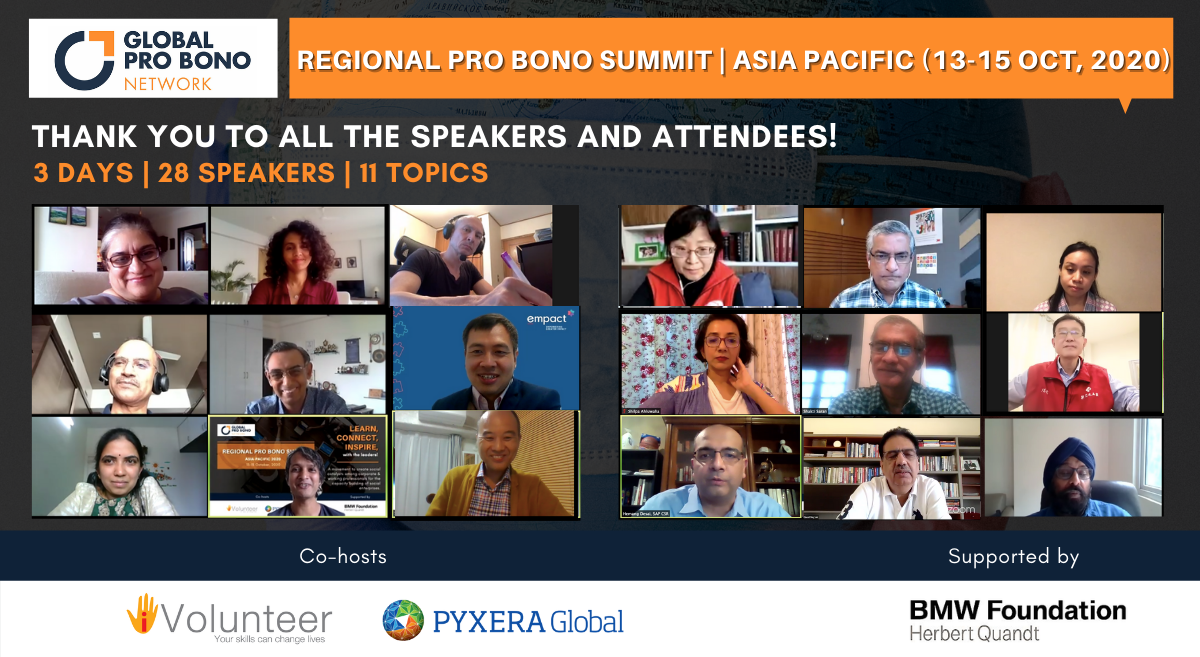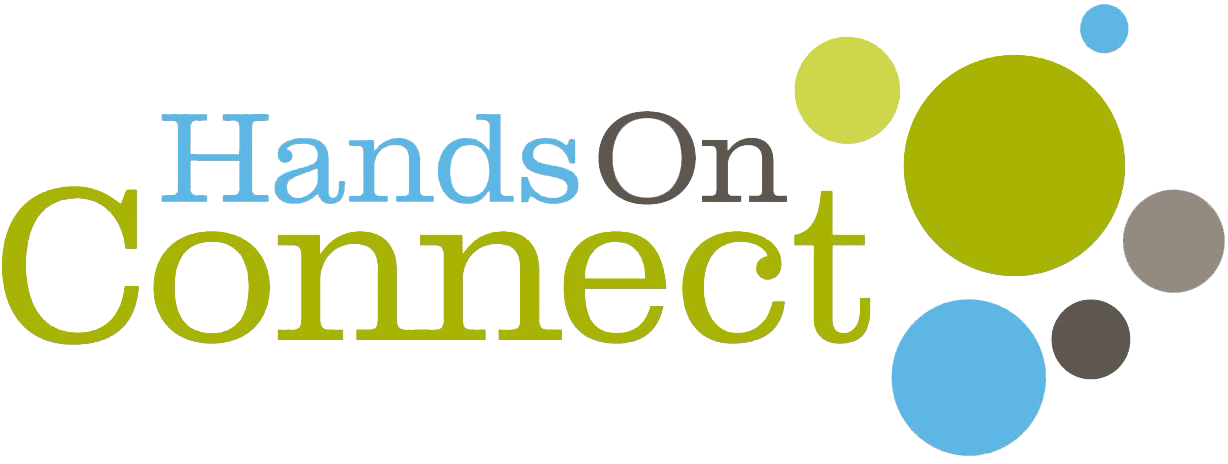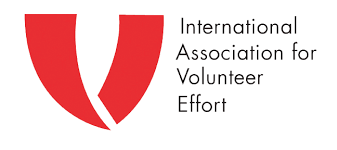
Log in with
Asia Pacific ProBono Summit, 13-15 Oct, 2020

Asia Pacific Pro Bono Summit brought together leaders of the pro bono movement to meet, discuss and share best practices. Held under the aegis of Global Pro Bono Network, the Summit was a forerunner to the Global Pro Bono Summit, Paris 2020 and the Latin American Pro Bono Summit 2020.
Theme: “Setting the Context for Pro Bono in the Aftermath of COVID-19.”
The APAC summit was structured to bring each of the key stakeholders in Pro Bono i.e. corporations, social sector organisations (SSOs) and participants in a spotlight. Each day was reserved for one stakeholder. A total of 25 speakers were featured in this summit. Of these three were from China, two each from Japan and Singapore and one each from Philippines and the United States and the remaining from India. The following themes emerged from the summit:
-
The purposes of a Business: COVID-19 has established in several ways that the higher purpose of a business is to bring all its stakeholders in harmony and to treat communities as central to their existence. Empathy in the corporate sector can be built by putting employees first and only if leaders walk the talk.
-
Imperative of Collaboration and Partnerships: Fighting the pandemic required SSOs to work in tandem with partners across the spectrum. Where partnerships were not struck pro-actively, the cost of mitigating the pandemic were higher. Pro Bono is central to leadership development of some organisations and a few are trying to align their CSR spend and volunteering programs. Pro Bono holds immense potential to spread the spirit of partnership building.
-
Objectives and benefits of Pro Bono: Objectives differ by stakeholders but lend themselves to synthesis. Corporations look at Pro Bono not just to support communities but also as an avenue to build leadership skills, particularly soft skills, critical and creative thinking skills. Social sector organisations get a chance to build crucial management and capacity building skills while for Pro Bono participants, this is an avenue for earning passion and commitment, learning new skills and gaining in terms of personal growth. Participants recounted their immersive experiences as life transforming and spoke of benefits which included broadening horizons and providing a holistic and systemic understanding to global and national challenges.
-
Building Bridges with the Social Sector: Different perspectives were shared but what came about as a common denominator was that corporate sector skills are not readily portable to the social sector without an adequate understanding of how the social sector functions. NGOs must not try and blindly replicate what works in the corporate sector. Some players in the corporate sector felt comfortable with the fact that Pro Bono could be transactional as long as it did the job while some players from the NGO sector felt that for Pro Bono to be most effective, it needs to lead to personals elf-transformation.
-
Leveraging Technology: There was a unanimous view that digital is inevitable and here to stay post COVID-19 but it has come with repercussions including a widening digital divide. Some organisations that had resisted embracing digital wondered why they had not done so before.
-
Future of Pro Bono: Virtual models are here to stay but the experiential element is too compelling and will be partly restored as in-person post pandemic. The future will be defined by collaboration and corporations need to transcend narrow mindsets and consider multi-company cohorts. Innovative implementation models are emerging such as contributing to the social justice space.
Contact Us for more details on the Summit; Download your copy of the comprehensive report.
Day 1 Video Link: https://www.facebook.com/ivolunteer.in/videos/866870537197346/
Day 2 Video Link: https://www.facebook.com/ivolunteer.in/videos/287100382258018/
Day 3, Forenoon Session Video Link: https://www.facebook.com/ivolunteer.in/videos/346995056622219/
Day 3, Afternoon Session Video Link: https://www.facebook.com/ivolunteer.in/videos/561634821291132/
SESSION SUMMARIES
Day 1, October 13: Setting the context for Pro Bono for Businesses in the aftermath of COVID-19
Welcome address: Shalabh Sahai, Co-Founder - iVolunteer, opened the Summit speaking about the larger impact of Pro Bono on the individual and the community and introduced the Global Pro Bono Network and its presence in the Asia-Pacific Region. Shilpa Ahluwalia, Director Global Pro Bono India & S.E.Asia, PYXERA Global, set the context of current pandemic times and how Pro Bono can be leveraged.
Keynotes
Amit Chandra, Chairman Bain Capital India and Co-Founder A.T.E. Chandra Foundation,
Mr Chandra spoke on the opportunity of realisation of triple bottom line benefits by businesses in the aftermath of COVID-19. Amit dwelt on the need for corporations to treat communities as central to their reason for existence. He dwelt on how important it was to define growth and that growth without inclusion is divisive. He stressed how key collaboration is and without it nothing can be accomplished. Had various community stakeholders come together to invest collaboratively, it would have reduced the cost of fighting the pandemic.
Vineet Nayar, Former CEO of HCL Technologies, & Founder Chairman & CEO of Sampark Foundation
Mr Nayyar spoke on the opportunity for us to relook at the mindless endeavour to profit at all cost and move towards to sustainable profits. The only way to achieve this is to put the spotlight on people and planet. He said it was imperative for businesses to demonstrate empathy towards employees and that the onus of demonstrating this lies on the business. Managements need to empower employees and show positive intention to inspire employees to create value. It should not be forgotten that an organisation needs its employees more than its employees need the organisation.
Panel: The imperative of collaboration and partnerships.
Ramesh Ramadurai, Country Head 3M India Dr. Robin Zhai Yan, Co-Founder & President, Beijing Pro Bono Foundation, Arun Pandey Regional Citizenship Program Director, John Deere
Dr. Robin Zhai Yan spoke about leveraging her experience from the SARS outbreak of 2003 to support those affected in Wuhan at the beginning of the year recounting the several parties she worked with in the healthcare ecosystem besides her outreach efforts to NGOs, the government and businesses. Arun Pandey spoke on the scope of marrying volunteerism with a company’s existing social development program to unlock greater community value. Ramesh Ramadurai dwelt on 3M’s response to the pandemic and how Pro Bono is a critical component of their leadership development program.
Fireside Chat: How can NGOs engage with corporates to deliver commonly agreed social good?
Naghma Mullah, COO, Edelgive Foundation in conversation with Puja Marwaha, CEO CRY, & Taira David Schaefer, Deputy Head of International Business and Corporate Planning / Sustainability at SMBC Nikko Securities, Japan
David Schaefer dwelt on how volunteering opportunities benefit individual employees; provide an opportunity to break their work monotony by applying their skills outside of their work environment and learn to think creatively through exposure to another sector. Naghma Mulla spoke about the objectives of volunteering and how it cannot be an afterthought and how her Foundation provides a differentiated approach to volunteering based on employee inclination. Puja Marwaha elaborated on the need for corporates to be clear on the purpose and objective for volunteering as much as NGOs need to be clear on why they need volunteers and what skills they required. Corporates and NGOs need to come together to identify and address skill gaps.
Video Link: https://www.facebook.com/ivolunteer.in/videos/866870537197346/
Day 2, October 14: Making Pro Bono effective and pervasive for Non-profits
Pecha Kucha Presentations (crisp presentations with stories of impact of pro bono)
Suchitra Naidu, Communications Manager, AERF India; Yan Changyun, Executive Director of Jingmen Volunteers Association, China; Paramjeet Singh, Managing Trustee of Dharma Bharti India; Elysa Chen, Executive Director, Campus Impact, Singapore
Suchitra Naidu spoke about her engagement experience with a cohort from 3M India, managed by PYXERA Global, and how this team significantly helped them in their marketing and communications strategy. Yan Changyun dwelt on how he and his organisation took the outbreak of COVID-19 in Hubei province head-on and how they galvanised resources through a process of collaboration and partner outreach. Paramjeet Singh spoke on the consequences of the pandemic; how they pivoted to provide online education to marginalised children through a tie-up with iVolunteer and how pro bono models can also provide support on-the-fly. Elysa Chan spoke about how her outfit scaled from three to 12 people and how a business clinic with a group of volunteers from Johnson & Johnson helped them to introspect, reflect and be clear about their organisation structure and communications approach
Panel:“Leveraging technology as Part of the New Normal.”
Panel members: Krie Lopez, Founder & CEO, Messy Bessy, Philippines; Maneesha Chadha, India CSR Head, JP Morgan; Prem Yadav, Co-founder and CEO, Pratham Infotech. Moderated by Annie Yan Peng of Beijing Pro Bono Foundation.
All panelists were unanimous in saying how the pandemic had forced NGOs to pivot and although a few successfully embraced digital many traditional NGOs felt left behind. Key takeaways:
- Digital is inevitable but it has come with repercussions including a widening digital divide
- Some organisations that had resisted embracing digital wondered why they had not done so before.
- Virtual Pro Bono and volunteering is here to stay and will grow but post- pandemic part of it will be restored as in-person. This is because a) the experiential dimension of pro bono is compelling and b) some under resourced groups will continue to need in-person hand holding.
Master Class Breakouts
Attendees elected one of the following 2 parallel masterclasses
- “Insulating from Murphy's Law-How to make Pro Bono work” - Aarti Madhusudan, iVolunteer, and, Shakti Saran, Senior Fellow, PYXERA Global
- "Learning from different models and making them work for you” - Shilpa Ahluwalia, Director Global Pro Bono-India & S.E. Asia - PYXERA Global, and, Shalabh Sahai, Co-Founder - iVolunteer
Video Link: https://www.facebook.com/ivolunteer.in/videos/287100382258018/
Day 3, October 15: Supporting individual participation and the pro bono ecosystem
Fireside Chat, “My life changed because of Pro Bono”
Harish Devarajan, Leadership Coach & Consultant, Independent Director Bank Of India, and Former HR Head - Hindustan Unilever, Gopi Govindan, HR Head of CLP Power India Ltd., Kanchan Shastry Lead Instock Manager, Cloudtail India,
Key takeaways
- Pro Bono broadens volunteers' horizons and provides a holistic and systemic understanding to corporate world challenges.
- It is dangerous to try and blindly replicate the metrics one uses in the corporate world and apply them to the social sector
- Pro Bono is a misnomer because the volunteer is getting a lot in return. The volunteer a) earns passion and commitment b) learns new skills and creative thinking and c) gains in terms of personal growth
- Corporations and NGOs both confuse outputs with impact. It's essential to draw a distinction. Impact is a long-haul play
- The interests of volunteers, corporations and NGOs need to be strung together harmoniously. To achieve this, all players need to embrace the maxim "comfort with ambiguity"
Panel:“How intermediaries can help Pro Bono volunteers”
Ikuma Saga, Founder & CEO - Service Grants, Japan Shalabh Sahai, Co-Founder - iVolunteer, India Peter Yang, Founder & CEO - Empact, Singapore Moderated by Shilpa Ahluwalia, Director Global Pro Bono-India & S.E. Asia, PYXERA Global
Key takeaways
- Differing views were aired on domestic versus cross-border Pro Bono efforts and these vary significantly by country. In Japan most of the Pro Bono activities are by and for domestic players, whereas in Singapore, most of the Pro Bono activities are offered outside Singapore. In India, most Pro Bono activities are domestic but India is also a favoured destination of cross border teams (as a recipient).
- Intermediaries need to work more closely with NGOs to explain the value of Pro Bono as often NGOs lack clarity and don’t have capacity to engage Pro Bono volunteers.
- It is imperative to kick-start an educational process for funders and donors about the value a Pro Bono Intermediary Organisation can add.
- Pro Bono alums can help in guiding new entrants and can play a vital coordination role
End-note: “The future of Pro Bono”, Hemang Desai, Global Program Director, Social Sabbatical Portfolio and Corporate Social Responsibility, SAP
Hemang spelled out key design principles, best practices and critical success factors that could shape the future of Pro Bono.
Key takeaways:
- Corporations need to be willing and ready to play the long-term game. Motivation is the cornerstone (filter) for selecting participants
- Corporations need to see PB as a Leadership Development program, one that fosters inclusive citizenship
- Volunteering can be transactional (like painting walls) but PB being transactional would almost be a disservice
- The future will be defined by collaboration and corporations need to transcend narrow mindsets and consider multi-company cohorts
- Innovative implementation models are emerging such as contributing to the social justice space. Virtual models are here to stay but the experiential element is too compelling
Video Link: Forenoon Session https://www.facebook.com/ivolunteer.in/videos/346995056622219/
Video Link: Afternoon Session https://www.facebook.com/ivolunteer.in/videos/561634821291132/
Summit Closure: Shalabh Sahai, Co-Founder - iVolunteer, and Shakti Saran, Senior Fellow, PYXERA Global brought the Summit to a closure summarising the key highlights from the 3 days and thanking the participants, speakers, organising team and the support from BMW Foundation.




